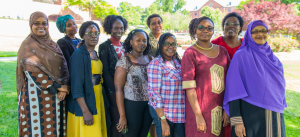
Eight women who comprise the fourth cohort of Eastern Mennonite University’s Women’s Peacebuilding Leadership Program began their intensive studies at the Summer Peacebuilding Institute this summer.
The women, selected from a competitive process in early 2016, have diverse professional experiences and skills: they are writers, poets, court officers, county commissioners, non-profit CEOs, lawyers, and educators – peacebuilders all – representing Kenya’s various geographic regions, religions and ethnic communities.
Their coursework at SPI is the first step in a 19-month process that will ultimately lead to a graduate certificate in peacebuilding leadership.
“It’s been wonderful to see our WPLP cohort here on campus, taking classes and sharing about their peacebuilding work with other SPI participants,” said Leda Werner, program director. “Their coursework in peacebuilding leadership, conflict analysis, and responding to violent extremism blends academic theory and practical tools, providing them with a solid foundation needed to carry out their intervention plans in their communities later in the program.”
The fourth cohort is one of two cohorts sponsored by a $900,000 grant from U.S. Agency for International Development (USAID) Kenya and East Africa. A second cohort of eight women from the Horn of Africa region will enter WPLP in May 2017. Launched in 2012, the WPLP program has graduated 42 women from Africa and the South Pacific.
Accompanying the group are Rosa Wanyagi, USAID Kenya and East Africa representative, and Nuria Abdi, a 2007 CJP graduate who serves as the cohort’s regional advisor.
The cohort is the first to engage with a new curriculum designed specifically to address USAID objectives of responding to violent extremism, women’s empowerment and good governance. Other structural and curricular changes reflect the program’s growth and development based on participant feedback and monitoring and evaluation data gathered from the previous three cohorts, Werner said.
SPI has been six weeks of “learning in class and outside of class on topics relevant for us and for our situations,” said Maryam Sheikh Abdikadir. The women engaged in personal assessments in the “Leadership for Peacebuilding” course, evaluating their own weakness and strengths and then learning new skills. Courses on conflict analysis and peacebuilding responses to violent extremism followed.
“So often we observe and end up judging,” Abdikadir said, “and being able to analyze perceptions, root causes, drivers, mitigators and allies within the conflict – that is really an important life skill that you can apply in all kinds of situations.”
Sharing and learning from international peacebuilders about their experiences with violent extremisim was “profound,” she added. “Listening to these examples from around the world caused me to look at my own situation differently.”
The women are in the midst of discerning the specific conflict they’ll address in the intervention project, the final phase of the program. Among the possibilities: addressing historic clan conflicts, community conflicts and cross-border conflicts in the northeast, western, and Rift Valley areas of Kenya; bolstering the use in courts of alternative dispute resolution for family and community-related violent conflicts; and working to resolve negative social effects of a government-led security operation aimed at protecting Kenya from Al Shabaab attacks.
The women return to Kenya with assignments to finish this fall. In January, they will take Strategies for Trauma Awareness and Resilience (STAR) Level 1 followed by an intervention design workshop led by former WPLP director Jan Jenner, MA ‘99. As the participants put their intervention plans into action in the spring of 2017, they are supported and guided through online praxis workshops, where they are joined by Abdi, WPLP staff and local and regional peacebuilding experts. A final class on mobilizing for systems change examines how to increase the reach of their intervention, which continue through the fall. A December 2017 graduation is planned.